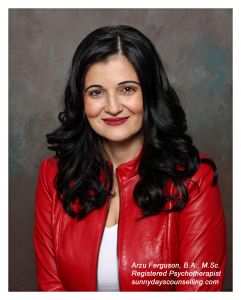I obtained my Bachelor of Art (Hon) degree in Psychology from Bogazici University, Turkey in 1995. I completed my Masters of Science degree in Health Psychology at University College London, England in 1997. I completed a post-graduate course in Ethical and Legal Issues in Counselling and Psychology at Seton Hall University, New Jersey, USA in 1998. Upon my arrival to Canada in 2000, I completed post-graduate Certificate programs in Children’s Mental Health, Adult Mental Health, and in Assessment and Treatment of Children at St. Michael’s College of University of Toronto. In 2010, I completed a Dual Certificate Program (Beginner and Advanced) in Cognitive-Behavioural Therapy offered by OISE/ University of Toronto and Hinks Dellcrest Centre/Gail Appel Institute. I further attended a 4-day training with Dr. David Burns in Advanced Cognitive Behavioural Therapy and T.E.A.M Therapy Techniques in 2012 in Toronto.
Most recently, I have completed Integrative Trauma Treatment training and working towards certification. I provide trauma treatment in the VQRP (Victim Quick Response Program) of the Ministry of Attorney General, Ontario. I have further completed Basic and Advanced training in Image Transformation Therapy and Feeling State Addiction Therapy with Dr. Robert Miller.
Beyond my academic background in psychology, I have more than 20 years of experience in the assessment and treatment children, adolescents and families in both clinical and school settings in Canada, England and Turkey. In Turkey, I worked directly with children with autism and developmental disabilities. For ten years (2000-2010), I worked as a Psychoeducational Consultant at the Toronto French School at both Mississauga and Toronto campuses. I worked directly with children from 3 years old to Grade 7, providing assessment and consultation to teachers and parents. I continued to work as a psychoeducational consultant in public schools within the Halton District School Board between 2011 to 2015.
I have been in private practice as a Psychotherapist since 2010 working with children, teens, university/college students, and families. I have obtained extensive experience over the years on different issues impacting children and youth such as attention deficit disorder, oppositional defiant behaviour, anger management, low self-esteem, shyness, social anxiety disorder, obsessive-compulsive disorders, anxiety, depression, panic disorder, eating problems, bulimia, fears, grief and loss, separation and divorce, blended-family issues, relationship difficulties and sibling rivalry.
I believe that no single clinical theory or approach is comprehensive enough to account for the complexities of human behaviour. My counselling approach to work with clients could best be characterized as integrative. Some therapies focus on bringing out feelings, others stress identifying thoughts and still others concentrate on actual behaviour. I use Cognitive-Behaviour Therapy, CBT with T.E.A.M Techniques, Dialectical Behaviour Therapy, Play Therapy, Mindfulness, Image Transformation Therapy, Grief Recovery Method and Integrative Trauma Processing in my treatment approach.
All my services are offered in a strictly confidential and welcoming environment with every effort made to ensure you or your child receive the best care.
As a mother of three children (ages 21, 16 and 10), I have first-hand experience and understanding of common childhood and adolescent issues. I can easily empathize with you whether you have a kindergarten-er, school-aged child or a teen. I speak fluently three languages (French, Turkish and English) and provide my services in all three. I also have good working knowledge in the Italian language. In my free time, I enjoy reading, visiting museums, gardening, painting, and doing jigsaw puzzles.
My Therapy and Counselling Approach
My main approach to therapy is Cognitive-Behavioural. This is a philosophy that helps clients understand the thoughts and feelings that influence behaviour. It is commonly used to treat a wide range of disorders including phobias, addictions, anxiety, and depression.
I also use a variety of different techniques in counselling, trying to find what will work best for you. These techniques are likely to include dialogue, interpretation, cognitive reframing, awareness exercises, self-monitoring experiments, visualization, journal keeping, drawing and reading stories with young clients. If I propose a specific technique that may have special risks attached, I will inform you of that, and discuss with you the risks and benefits of what I am suggesting. I may suggest that you consult with a physical health care provider regarding somatic treatments that could help your problems; I will be glad to discuss with you the pros and cons of various alternatives.
Therapy also has potential emotional risks. Approaching feelings or thoughts that you have tried not to think about for a long time may be painful. Making changes in your beliefs or behaviours can be scary, and sometimes disruptive to the relationships you already have. You may find your relationship with me to be a source of strong feelings, some of them painful at times. It is important that you consider carefully whether these risks are worth the benefits to you of changing. Most people who take these risks find that counselling is helpful.
Common areas that Psychotherapy and Counselling can help YOU
- Anxiety
- Depression
- Obsessive-Compulsive behaviours and thoughts
- Panic symptoms
- Panic symptoms
- ADHD
- Difficulty with sleep
- Controlling your anger and temper
- Chronic pain
- Fears and phobias
- Trauma and post-traumatic stress (PTSD)
- Chronic illness
- Loss and grief
- Lack of self-confidence
Common areas that therapy can help YOUR CHILD/TEEN
- Oppositional defiant behaviour
- ADHD
- Bullying and peer pressure
- School problems (academic underachievement, learning disabilities)
- Anger (excessive yelling, swearing, crying)
- Power struggle with parents
- Difficulty with sleep
- Anxiety
- Sleep problems
- Sibling conflicts
- Coping with parents' separation or divorce
- Step-parenting issues
- Coping with a loved one's chronic illness
- Loss and grief
- Lack of self-confidence
- Mood swings, feeling blue or depressed

